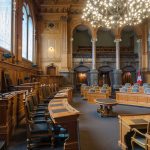Alabama has approached the U.S. Supreme Court, seeking to pause a lower court's verdict which obstructed their recently modified congressional map. Alabama claims they aren't required to establish a second district with a majority of black voters. They believe doing so would lead to a racial division under a court-directed plan.
https://x.com/business/status/1701401346161758664?s=20
In the past June, with a narrow 5-4 vote, the Supreme Court decided Alabama must revise its congressional districts. This was to enable black citizens to vote for candidates of their choice as stipulated by the 1965 Voting Rights Act. However, the version that the state's legislature approved in July presented only one district where black individuals were the majority, even though they constitute 27% of the state's populace.
Last week, the U.S. District Court for the Northern District of Alabama deduced that state officials hadn't obeyed a prior court instruction to align with the federal Voting Rights Act in designing the new districts. The court didn't accept the state's reasoning that incorporating an additional district with a black majority would be equivalent to unconstitutional positive discrimination.
Wes Allen, the Alabama Secretary of State, has implored Justice Clarence Thomas to pause the inferior court's decision by October 1. They contend that this verdict would pave the way for a racially divided court-ordered map, which would split communities based on interests, conflicting with their redistricting principles.
On Monday, a three-judge panel denied Mr. Allen's plea for a delay concerning a mandate to appoint a specialist to draft three prospective congressional districts. This group surmised that Alabama's primary districting plans might likely undercut the voting power of its black residents. As a result, an expert designated by the court will now outline Alabama's congressional districts for the 2024 elections.
The panel highlighted that there wasn't any pressing urgency, and everything was progressing as anticipated. They also questioned Mr. Allen's confidence in his subsequent Supreme Court appeal, especially since the state's legislature already conceded their design didn't provide the added district as mandated by federal regulations.
The next move of the Supreme Court on Alabama's requests is uncertain. However, the ongoing redistricting debate in Alabama promises to be a clash of diverse interests and legal views. Stay connected for further developments on this evolving narrative.




